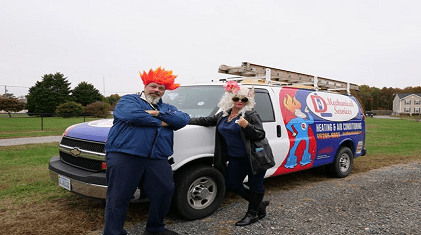A cold, air conditioned home is one of life’s most important comforts, especially during humid, hot sticky days of summer. So finding out your AC unit isn’t working properly can leave you hot under the collar — literally! What to do?
5 Things That Can Go Wrong With Your AC System
“There is no substitute for getting a good HVAC technician to make a visual inspection of your ducts, joints, seams and other parts of your unit,” says Darren Billington, owner of D and L Mechanical Services. Here are five common reasons your AC unit might be costing you more by wasting energy, working ineffectively, or not working at all:
- Leaky duct work. According to the Department of Energy, 20 to 30 percent of the air that moves through the duct system of the average home is lost due to leaks, holes, and poorly connected ducts. This leads to two problems: it wastes valuable cooled air and brings unwanted contaminants into your home, including mold, odors and allergens.
- Dirty coils. “The AC electro-mechanically and chemically absorbs heat from your home and ejects that heat outside,” says Billington. “To absorb heat, coils have to be cold and slime-free.” Over time, acteria and airborne contaminants can combine to create a film that traps heat in AC coils, making them less effective.
- Broken condenser fan. “A coil is like the radiator in your car,” explains Billington. “If the fan isn’t pushing enough air across it, it’ll overheat.” The coils suck heat out of the air, and the condenser fan blows it out of your home. If the fan isn’t working efficiently, your energy bills will go up as your AC performance goes down.
- TXV issues. The thermal expansion valve, or TXV, is a modulating unit in your air conditioner that regulates the amount of refrigerant depending on how much cooling is needed. “If it’s not moving properly, it can either flood the system or restrict the flow — either way, it’s not good,” notes Billington.
- Age of the unit. “The useful life expectancy of an AC unit is usually between seven and 10 years — depending on where you are in the U.S, and the number of heating and cooling hours you use,” says Billington.
Higher energy bills and lower performance are sure signs your AC unit needs fixing, but these other symptoms are also cause to call for service:
- Moldy odors or other smells
- A noisy air flow, or bumping noises when the blower starts up
- Streaks of what looks like dirt on air conditioning grills
- Recurrent power failures in your area (voltage issues can damage AC units)
The good news? “It is quite easy for a trained, competent HVAC technician with the right diagnostic tools to conduct a battery of tests and quickly ascertain if corrective action is needed,” says Billington. Regular maintenance is also key: it will not only prolong the life of your unit, but help you keep your cool.
Keep your home’s air conditioning system working safely and efficiently with a VIP membership from D and L. Questions call us at (540) 295-6697 for more information.



